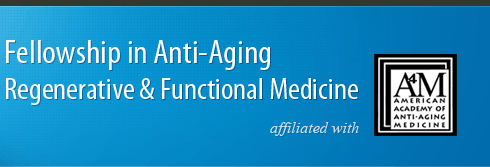- Easy to use online video sessions
- Same experts as live modules
- Same material as live sessions
- Learn from your home or office
- Avoid travel expenses
- Save time and money
Fellowship in Integrative Cancer Therapies
The American Academy of Anti-Aging Medicine is proud to present the first and only existing Fellowship in Integrative Cancer Therapy.
Watch this FREE preview of a four-hour lecture by Dr. Mark Rosenberg on Integrative Cancer Therapy.
To purchase the entire four-hour lecture online, please call:
888-997-0112 ( Toll-Free - US Only )
561-997-0112 ( International )
What is Integrative Cancer Treatment (ICT)?
Integrative Cancer Treatment is a unique therapy for treating individuals with cancer. This therapy utilizes multiple modalities, including but not limited to, off-label pharmaceuticals, neutraceuticals, vaccines and other types of immunotherapy, novel drugs/substances not yet approved in the U.S., dietary treatments, mind-body techniques, hyperthermia, homeopathy, in addition to traditional therapy.
Why should cancer patients seek ICT vs. traditional cancer treatment?
Traditional cancer treatment is efficacious for early stage cancer. Unfortunately, in the U.S., we have made little progress in the treatment of advanced stage cancers in the past twenty years. A study was published in the British journal, "Clinical Oncology," in December, 2004, entitled, "The Contribution of Cytotoxic Chemotherapy to 5-Year Survival in Adult Malignancies." The authors, one medical oncologist and two radiation oncologists, analyzed the results of all randomized clinical trials performed in the U.S. and Australia, that reported a statistically significant increase in 5-year survival due to the use of chemotherapy in adult malignancies. The trials that were analyzed were performed between 1990 and 2004. The authors' conclusions were the following:
- Contribution to 5-year survival in Australia was 2.3%
- Contribution to 5-year survival in US was 2.1%
- Median survival in lung cancer has increased by 2 months in the past 20 years
Overall survival benefit of less than 5% has been achieved in the adjuvant treatment of breast, colon, and head and neck cancers. Clearly, the need for an alternative form of cancer treatment is great and imminent.
Who should attend the Integrative Cancer Fellowship?
All healthcare practitioners can benefit from this fellowship. In addition, all healthcare practitioners, regardless of specialty, can practice ICT. Although oncologist are welcomed and urged to attend this fellowship, the majority of attendees will be non-oncologists.
What benefits will be afforded by attending this fellowship?
The knowledge gleaned from attending this fellowship will allow practitioners to provide improved cancer treatments, allowing a better quality and quantity of life for cancer patients. In addition, practitioners will be learning "cutting edge" therapies. Although, monetary gain should not be the primary motive, this type of practice is lucrative to the healthcare provider. Because much of the alternative treatments is not covered by insurance, the patients must pay out of pocket. This is analogous to the practice of Anti-aging Medicine.
Criteria for completion of the fellowship includes:
I. Molecular Biology of Cancer
- Personalized Chemotherapy Based on Tumor Profiling
- Antioxidant Use in Cancer Therapy
- Nutritional Approach to Cancer Therapy
- Genetic and Viral Predispositions to Cancer
II. Understanding Tumor Classification, Staging, and Grading
- Overview of Complementary and Alternative Medicine in Cancer Therapy
- Harnessing the Febrile immune Response in the Treatment of Advanced-stage cancer
- Coley's Toxins
III. The Role of Radiation Therapy in Cancer Treatment
- Cutting-edge Radiation Therapy technology
- Understanding Chemotherapy - Old and New Drugs
- Understanding hematopoietic stem cell transplantation
- Off-label Pharmaceuticals in Cancer therapy
IV. Assessment and Treatment of Problems Common to the Cancer Patient
- Assessment and Treatment of Hematologic Complications in the Cancer Patient
- Assessment and Treatment of Cancer-related venous thromboembolism
- Managing Cancer-related Infections
- Metabolic and Paraneoplastic Syndromes
V. Non-pharmacologic Complementary Therapies in Cancer Therapy
- Calorie Restriction, Amino Acid Restriction, Carbohydrate Restriction, and the Ketogenic Diet- can these dietary manipulations affect cancer outcome?
- Treating Cancer with Immunotherapy
- Treating Cancer with Hyperthermia
- Herbal Supplementation in Cancer therapy I
VI. How to Manage an Integrative Cancer Practice
- Herbal Supplementation in Cancer therapy II
- Integrative Cancer Therapy in Review
- Q & A
Additional Features:
- Participants will leave the Fellowship competent to practice Integrative Cancer Therapies without supervision in his or her area of medical specialty.
- Off-label pharmaceuticals will be included with each module
- Open to physicians, physician assistant, nurse clinicians, pharmacists, D.D.S. and chiropractors.





